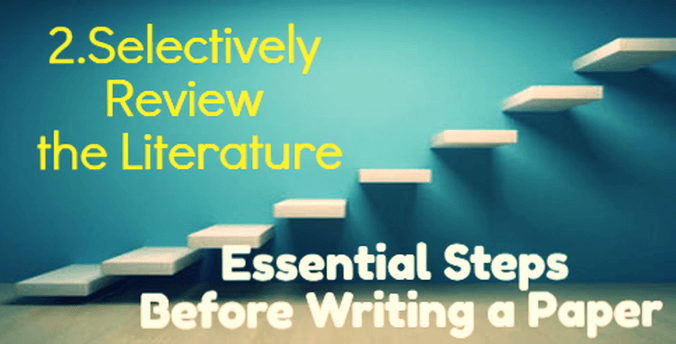Selectively Review the Literature 2/5

It is vital to review the relevant literature, to ensure that no important observations that either support your findings or contradict them have been missed.
Failure to mention such references will create a poor impression and may seriously impair the chances of publication (especially if you miss publications by one or more of the referees). Thus, it is essential to search all of the relevant databases, such as CAB Abstracts (http://cababstracts.edina.ac.uk) and ISI Web of Knowledge (SM) , using all of the potentially relevant keywords. The websites of these databases themselves, and a number of books and other web sources (e.g., Harvard College Library’s site; http://hcl.harvard.edu/research/guides/citationindex/accessed September 5, 2010), describe ways to search these databases.
However, you can only tell what fields of literature you need to scan when you know precisely what each section of a planned paper is going to cover, and thus the kinds of references you need to cite. Otherwise much time could be wasted reading material that is only tangentially related to your study. For instance, if you tried to read every report that has ever been written on over-fertilization of every type of soil, supporting every crop, and all the associated problems, you would never stop reading.
Furthermore, a detailed review of the literature before drafting a paper can be counter-productive, since nearly all of the papers that could be read will have some sections that are relevant to your study, but also many sections that have little relevance. Reading such papers can be seriously distracting because they will present many ideas that you may start to think should perhaps be mentioned, complicating rather than helping attempts to draft a clear, coherent framework. In addition, you are likely to be an expert in the subject (otherwise you would not have been able to plan and execute the work) and you should already have good knowledge of the pertinent literature. Therefore, it is generally better to draft your paper first, and then identify the aspects of the literature that you can selectively focus on. Hence, we recommend restricting any literature survey, at this stage, to at most a couple of recent reviews to refresh your memory about key aspects of the subject that may need to be covered, jotting down brief details of references that could be cited. However, even this is optional until the framework of the paper has been drafted.
Key steps in writing several sections of a paper (especially the Introduction and Discussion) are identifying appropriate references and deciding where they should be placed. There are two classes of references: essential and illustrative. Essential references are those that have to be cited because they are critical for justifying your study, those for instance showing that a model you used provides robust predictions for analyses such as yours. Illustrative references are those that have been selected from a large number that could have been cited, showing (for instance) that over-fertilization of soil can cause poor root development. A systematic way in which both classes of references can be identified and allocated suitable places for citation is shown in the descriptions of procedures applied to construct sections of papers describing the case studies. However, it should be noted here that, if possible, for illustrative references it is sensible to choose those published by likely referees.
Reference:
Blackwell, J., & Martin, J. (2011). A scientific approach to scientific writing (p.6). Springer Science & Business Media.

Literatue in metropolitan sprawl, for instance, I have already made an essay on urban sprawl out of what i have in mind about sprawl, beside what i observed realistically about the matter in research criteria. specifically, the analysis is well done and highly marked in revision as original work, how ever lacks comparison evidence in literature review.The question if the research work in this essay is extremely original, what obligation to review other researcher work?and in what criteria of reviewing?